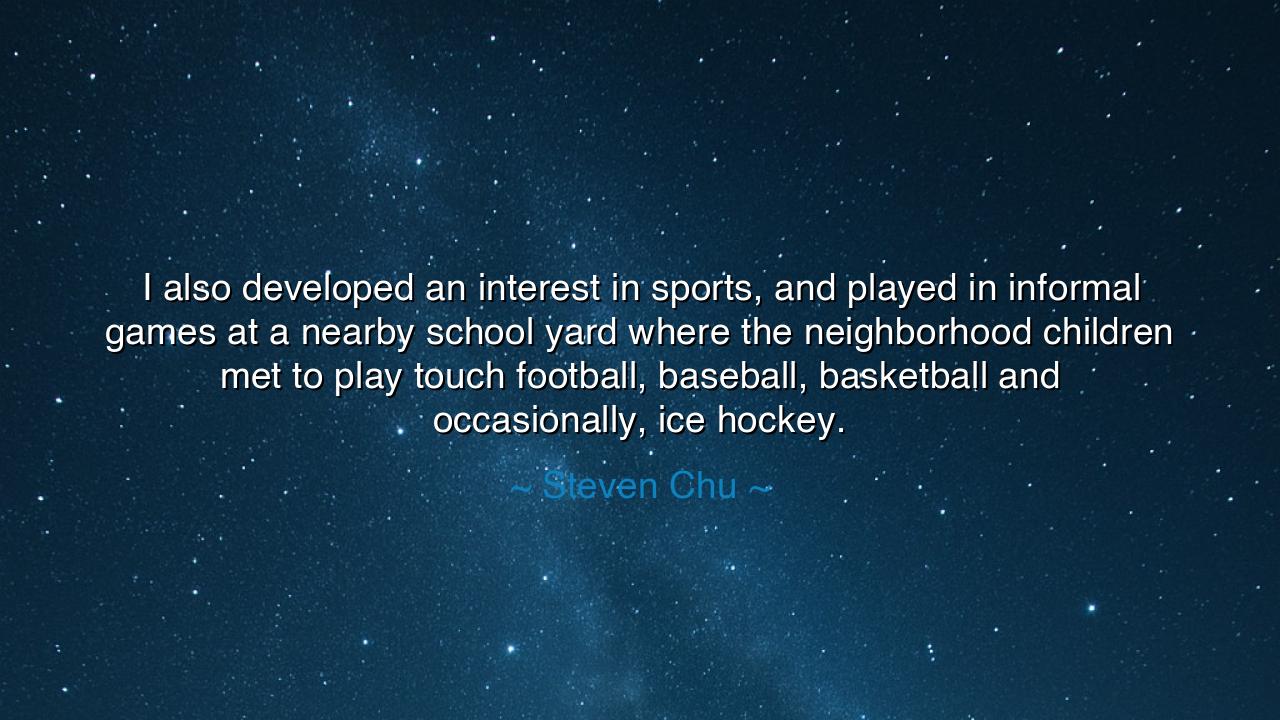
I also developed an interest in sports, and played in informal
I also developed an interest in sports, and played in informal games at a nearby school yard where the neighborhood children met to play touch football, baseball, basketball and occasionally, ice hockey.






When Steven Chu recalled, “I also developed an interest in sports, and played in informal games at a nearby school yard where the neighborhood children met to play touch football, baseball, basketball and occasionally, ice hockey,” he was not merely describing the play of childhood. He was testifying to the formative power of games, the way that sport binds community, shapes character, and trains both body and mind. His words are simple, but beneath them lies a timeless truth: in the shared ground of play, young souls are forged into men and women capable of discipline, resilience, and cooperation.
The school yard becomes, in this vision, more than a patch of earth; it is a temple of growth. There, with no great stadium or roaring crowd, children test themselves against one another, learning the rules of fairness, the sweetness of victory, and the sting of defeat. To play football, baseball, basketball, or hockey in this spirit is to participate in a miniature of life itself. Each game is a contest where skill, courage, and unity determine the outcome, and each contest leaves an imprint upon the soul.
The ancients knew this truth. The Greeks, who gave the world both philosophy and the Olympic Games, believed that a sound body was the companion of a sound mind. Plato himself warned that to neglect physical training was to diminish the capacity of the intellect. Thus, in their academies, young men learned geometry and rhetoric, but they also wrestled and ran. They understood, as Chu did in his youth, that to chase a ball in the dust and to match wits with friends in play was not frivolous, but essential to a balanced life.
History offers us many examples of this balance. Consider Theodore Roosevelt, who as a boy was frail and sickly. His parents feared he would not survive. Yet through vigorous exercise—boxing, horseback riding, hiking—he transformed himself into a robust man, fit not only for adventure but for leadership. His love for sport infused him with endurance and courage, qualities that would later carry him to the presidency and beyond. In this, we see mirrored Chu’s remembrance: that the lessons of the playground do not vanish, but accompany us into the halls of power and science.
There is a deeper meaning in Chu’s reflection: that sport teaches us not merely to compete, but to belong. In those neighborhood games, no one stood alone. Children gathered, teams formed, bonds were woven. To pass a ball, to defend a goal, to share the thrill of play, is to learn that life itself is not a solitary journey. It is lived in fellowship, in the rhythm of giving and receiving, of striving not only for the self but for the whole. This is the wisdom hidden in his memory of simple games beneath the open sky.
What lesson, then, should we take? It is this: nurture the body as you nurture the mind, and embrace the fellowship of play. Do not scorn games as idle diversions. Instead, see them as training grounds for resilience, humility, and unity. Just as Chu would later rise to win the Nobel Prize in Physics, carrying the discipline and spirit he learned on the school yard, so too can we draw from the games of youth the strength to face the challenges of adulthood.
Practically, let us revive this practice: rise from your desk, step away from your labor, and enter into the field—be it with friends, family, or neighbors. Engage in play not merely for fitness, but for joy, for connection, for the sharpening of body and spirit alike. In these moments, you will rediscover what Chu knew: that greatness is not only found in books or laboratories, but also in the laughter of children and the lessons of the game.
Thus, the memory of Steven Chu becomes a teaching: that the seeds of wisdom and endurance are often sown in the humble grounds of play. The school yard, with its dust and laughter, is as mighty a classroom as any university. And those who honor both the mind and the body, who embrace both solitude and fellowship, will walk with strength, resilience, and joy upon the path of life.






AAdministratorAdministrator
Welcome, honored guests. Please leave a comment, we will respond soon